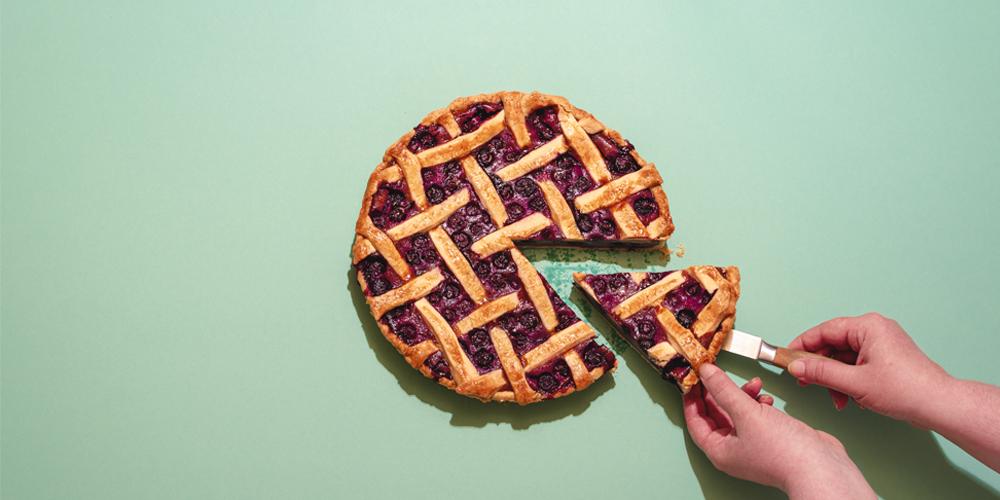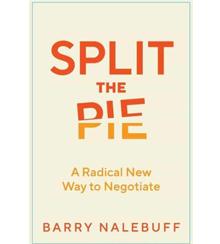A kinder, gentler deal
With his book Split the Pie, Yale School of Management professor Barry Nalebuff offers a consistent, fair, and scalable approach to negotiation.
Split the Pie: A Radical New Way to Negotiate
by Barry Nalebuff, Harper Business, 2022
Anyone who has been the underdog in a negotiation is going to eat up Barry Nalebuff’s new book, Split the Pie. The Milton Steinbach Professor at the Yale School of Management, who cofounded Honest Tea as a side gig, combines logic and empathy in a strategy that undercuts power-driven negotiating tactics.
The simple principle that drives Nalebuff’s approach is this: the negotiation pie—that is, the value produced by the deal, over and above the value that the parties to the deal can create on their own—should be equally spilt. It doesn’t matter who has the most power or who needs the deal the most—what matters is the value stemming from the deal and the inability of either party to achieve it without the other. In this sense, all the parties to the deal have a legitimate claim to an equal share of the negotiation pie.
Nalebuff illustrates this concept with an easily followed example: a pizzeria will give Alice and Bob a 12-slice pizza if they can agree how to split it. If they can’t, it will give them half a pie, but unequally divided: four slices to Alice and two slices to Bob. These no-deal slices comprise what Roger Fisher and William Ury called the BATNA (best alternative to a negotiated agreement) in their best-selling negotiation book, Getting to Yes.
Nalebuff’s solution is to focus on the additional slices that Alice and Bob get if they make a deal. He splits the six additional slices in half. This gives Alice a total of seven slices (her BATNA of four slices plus her half of the six slices in the negotiation pie) and Bob gets five slices (his BATNA of two slices plus his half of six slices in the negotiation pie). Voilà.
“The pie framework will change the way you approach negotiations in business and life,” writes Nalebuff, who has been teaching this approach to MBA students and executives at Yale for the past 15 years, as well as online at Coursera. “It will allow you to see the negotiation more clearly and more logically. It will lead you to an agreement where the principle applied doesn’t depend on the specifics of your situation. It will help you make arguments that persuade others by identifying inconsistencies in their approach.”
The pie framework will change the way you approach negotiations in business and life.”
Nalebuff tracks this negotiating approach back 2,000 years to a case described in the Babylonian Talmud, the basis for Jewish law. In it, two people appear in court holding a garment. One claims the whole garment; the other claims half of the garment. The court awards the former claimant three-quarters of the garment and the latter one-quarter of the garment. How does this align with the pie approach? “If we look at both claims together, we see the dispute is really over half the cloth,” explains Nalebuff. “The Talmud solution is to give each party what has been conceded to him and then split the amount in dispute.”
As logical as this sounds, there are nuances involved and difficulties in determining the size of the pie that make splitting it far more complex than divvying up a pizza. For instance, when Coca-Cola expressed its interest in acquiring Honest Tea from Nalebuff and cofounder Seth Goldman, the two were thrilled at the prospect of tapping the soft drink giant’s economies of scale and market reach to grow their 10-year-old company—but they weren’t ready to sell. The parties got over this hurdle by agreeing that Coke would first buy a minority stake in Honest Tea in 2008, and then, after three years, have an option to buy the rest. But how much would Coke pay in three years? It would be helping Honest Tea with purchasing, production, and distribution over that time, and it didn’t want to pay more for it because of its own efforts.
“My counter was that the two parties were equally needed to make those additional sales possible,” explains Nalebuff. “Yes, Honest Tea couldn’t get the sales without Coke’s trucks, but Coke couldn’t make those extra sales without Honest Tea to put on their trucks. Only by coming together could we create a pie.” They solved the problem by establishing a price based on a multiple of the projected sales in three years sans Coke’s participation, plus a payment of half the multiple of the actual sales above that projected level. In other words, they split the value they jointly created. (Coke, which acquired Honest Tea in 2011, this spring announced plans to phase out the brand from its beverage portfolio by the end of the year.)
One of the highlights of Split the Pie is the degree of scrutiny and rigor that Nalebuff has devoted to developing the approach. But if there is one sticking point, it seems to be the ability to convince all parties in a negotiation to adhere to its dictates, especially parties who believe that they have the more powerful position. Although Nalebuff strives mightily to equip readers to make a convincing argument for splitting the pie, his own experience shows that is likely to be easier said than done.
To wit: Nestlé USA tried to purchase Honest Tea before Coke. An approximate price was established that took into account the value created by the deal (the pie), recalls Nalebuff, “but when the Swiss headquarters saw the number, the CEO got sticker shock and nixed the deal. The head of Nestlé USA came back to Honest Tea with a much-reduced number—I said no. He then wrote to Seth implying that I had ruined the hopes and dreams for Seth, his family, and all their future generations.”
Tetley also tried to buy Honest Tea. When Honest Tea refused its offer, the message Tetley’s CEO conveyed, according to Nalebuff, was, “If you don’t sell to us, we will crush you like these tea leaves.”
Nalebuff obviously enjoys getting some payback for being on the receiving end of these hardball tactics, but it is a lucky thing that Honest Tea was in play and Coke was in the wings. Imagine the situation if Nalebuff and Goldman needed to sell and their only choices were Nestlé USA and Tetley. It doesn’t seem like either company was interested in splitting the pie.
Author profile:
- Theodore Kinni is a contributing editor at strategy+business. He also blogs at Reading, Writing re: Management.




